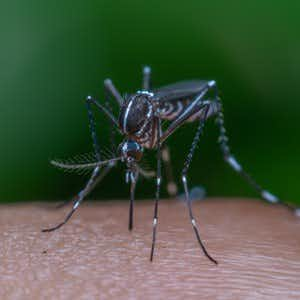
Preventing bites from mosquitoes and ticks could mean side-stepping a serious infection such as West Nile virus or Lyme disease. So it’s no wonder people are on the lookout for ways to avoid these bites. DEET is the most common insect repellent. The EPA has concluded that DEET is safe, but many people worry about potential toxicity. As a result, they search for other ways to avoid bites. One reader has come up with an interesting approach:
Natural Ways to Repel Mosquitoes and Ticks:
Q. I use either coconut milk or coconut oil on my skin when I go out. Originally, I put it on to see if it helped protect me from the sun. I think it helped, though I have no proof.
Then I noticed that I had no ticks, even though my yard is overrun with them. In addition, no mosquitoes were biting. They hover, but they don’t land.
Is There Science to Support Coconut Oil Against Mosquitoes and Ticks?
A. Many people use coconut oil on their skin as a moisturizer, but you are the first to suggest it might serve as a bug repellent. The few scientific studies that have looked at coconut oil to repel mosquitoes used it as a base for other essential oils. Neem oil (2 percent) in coconut oil is quite effective (Sharma et al, Journal of the American Mosquito Control Association, Sep. 1993). In addition, ylang ylang (Canaga odorata) extract in coconut oil is useful, though not quite as effective for preventing mosquito bites as DEET (Soonwera & Phasomkusolsil, Acta Tropica, Feb. 2015).
When mosquitoes carry dangerous diseases such as Zika or West Nile virus, we urge people to use a proven effective repellent such as lemon eucalyptus oil, picaridin or even DEET. Neem oil or ylang ylang in coconut oil could possibly work, but you might have a harder time finding these herbal extracts than commercial repellents.
As for ticks, a commercial tick repellent product with a coconut oil base is an effective tick repellent (Schwantes et al, Parasites & Vectors, April 2008). The product is Zanzarin® Bio-Hautschutz Lotion (Engelhard Arzneimittel, Germany). It is probably difficult to find in the United States.
Will Coconut Oil Protect You from Sunburn?
You mentioned that you initially started applying coconut oil or coconut milk to prevent sunburn. We checked to see if there was any research on that, and found that oils, including coconut oil, don’t offer significant protection against damage from ultraviolet light (Gause & Chauhan, International Journal of Cosmetic Science, Aug. 2016). However, Korean scientists have found that culture coconut extract, a fermented coconut oil product, can improve skin barrier function and ease inflammation resulting from sunburn (Kim et al, Food and Chemical Toxicology, Aug. 2017). We have not seen this product on the market.

